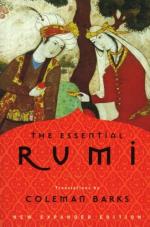
|
| Name: _________________________ | Period: ___________________ |
This test consists of 15 multiple choice questions and 5 short answer questions.
Multiple Choice Questions
1. Which prominent individual favors Ayaz in Book 2, Chapter 3?
(a) Sorcerer.
(b) Priest.
(c) King.
(d) Sheik.
2. In "Town and Country," the countryside man becomes good friends with a:
(a) Shopkeeper.
(b) Librarian.
(c) Cook.
(d) Gardener.
3. In one of the poems in Chapter 2, Book 2, a king falls in love with a girl and decides to do what?
(a) Give her a house.
(b) Offer her a job.
(c) Kidnap her.
(d) Step down from the throne.
4. The "Huuuu" mentioned in Book 2, Chapter 3 is what?
(a) Means of transportation.
(b) Article of clothing.
(c) Drink.
(d) Chant.
5. The people who are jealous of a particular man in a poem in Book 2, Chapter 3, do not think they are better than him; rather, they are displeased with:
(a) The way he ridicules them.
(b) The fact that he has twelve wives.
(c) The high esteem he enjoys.
(d) The way the teacher favors him.
6. The "Solomon Poems" are devoted to the spiritual life, referring to:
(a) How one can buy his or her way to heaven.
(b) The hereafter.
(c) This world, not the next.
(d) Man's fruitless pursuits.
7. In a poem in Book 2, Chapter 1, after a wise man feeds a poor man, what does he make the poor man do?
(a) Exercise vigorously.
(b) Sleep for three days.
(c) Pay him back.
(d) Take a loaf of bread to his family.
8. In a poem in Chapter 2, Book 2, about a king who loves a girl, what does the doctor say is afflicting her?
(a) She misses her parents.
(b) She's in love with another man.
(c) She wants to go home to her husband.
(d) She's confused by the king's behavior around her.
9. In "Town and Country," how does the town man usually reply to his country friend's invitation to visit him in the country?
(a) No.
(b) Next year.
(c) Never.
(d) Tomorrow.
10. What does the smartest of three fish do in the fish tale in Book 2, Chapter 1?
(a) Leaves.
(b) Blows bubbles.
(c) Eats a bug.
(d) Sleeps.
11. Which of the three fish in the fish story in Book 2, Chapter 1, ends up getting caught?
(a) The least intelligent one.
(b) The one of medium intelligence.
(c) The smartest one.
(d) None.
12. What does the least intelligent fish do in the tale of three fish in Book 2, Chapter 1?
(a) Offends the other fish.
(b) Jumps up and down.
(c) Stares at the insects.
(d) Insults the crocodile.
13. In the story of three fish that possess some measure of intelligence, found in Book 2, Chapter 1, who do the fish face?
(a) Bigger fish.
(b) Human fishermen.
(c) Three insects.
(d) A hungry crocodile.
14. Chapter 2 of Book 2 includes a large quantity of:
(a) Ghost tales.
(b) Animal fables.
(c) Love stories.
(d) War stories.
15. In each of the love triangles presented in Chapter 2, Book 2, the woman's behavior:
(a) Changes with each story.
(b) Saves the day.
(c) Is difficult to translate.
(d) Remains the same throughout all the stories.
Short Answer Questions
1. What happens to the second son who tries to woo a Chinese princess in one of Rumi's poems in Chapter 2, Book 2?
2. In the poem in Book 2, Chapter 3 where a group is terribly jealous of a particular man, who is this man?
3. Through many of his poems, Rumi reveals the depth and diversity of different types of:
4. In one poem in Book 2, Chapter 1, Rumi uses the image of Jesus Christ riding atop a donkey to explain a lesson about what?
5. In Coleman Barks' folklore introduction to the poems in Chapter 2, Book 2, what is placed inside the pockets of the dead man?
|
This section contains 598 words (approx. 2 pages at 300 words per page) |

|




